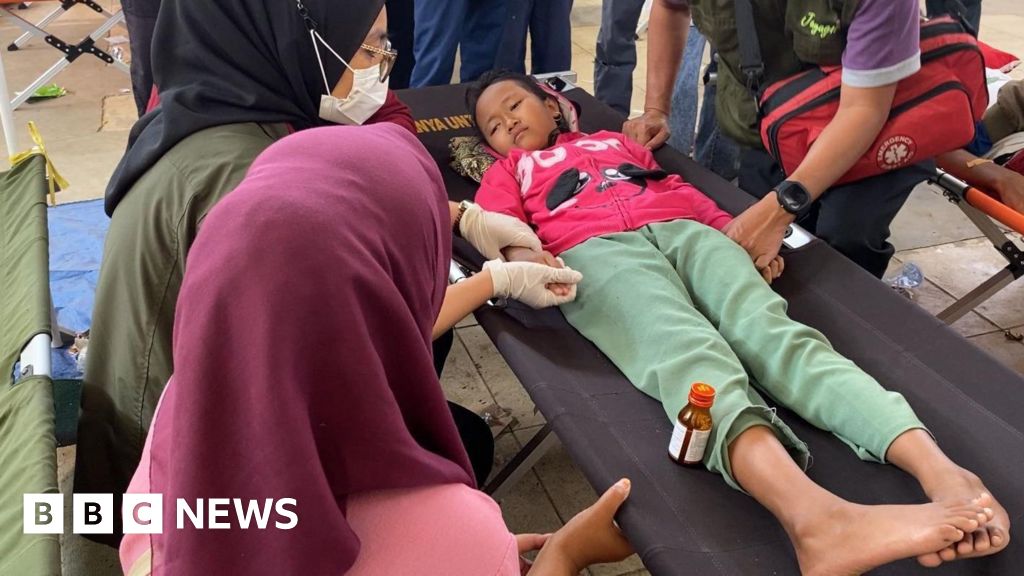Health
Over 1,000 Indonesian Children Fall Ill from School Lunches

More than 1,000 children in Indonesia have fallen ill after consuming free school lunches this week, raising serious health concerns about the government’s multi-billion-dollar nutritious meals programme. Health authorities reported a total of 1,171 poisoning cases between Monday and Wednesday, with the majority of victims located in West Java’s Cipongkor district. This incident follows a previous outbreak last week that affected 800 students across West Java and Central Sulawesi.
Yuyun Sarihotima, head of West Java’s Cipongkor Community Health Center, confirmed the troubling figures to BBC Indonesia. The nutritious meals initiative, spearheaded by President Prabowo Subianto, aims to provide free lunches to approximately 80 million school children nationwide. However, a series of food poisoning incidents linked to the programme has prompted calls from non-governmental organizations for a suspension of the initiative due to health risks.
On Wednesday, Coordinating Minister for Community Empowerment Muhaimin Iskandar stated that there are currently “no plans to stop it.” Victims reported symptoms including stomach aches, dizziness, nausea, and even shortness of breath, which is atypical for food poisoning. Previous investigations into the programme have indicated negligent food preparation as a suspected cause, with reports of expired ingredients and unsanitary practices.
The meals served this week included soy sauce chicken, fried tofu, vegetables, and fruit. Notably, past incidents have pointed to the use of expired soy sauce and, in one case, the serving of fried shark. The head of Indonesia’s National Nutrition Agency, Dadan Hindayana, attributed the recent mass poisoning in Cipongkor to a technical error by the Nutrition Fulfillment Service Unit (SPPG), which has since suspended its operations.
In response to the situation, West Bandung Regent Jeje Ritchie Ismail declared the mass poisoning an “extraordinary event,” allowing for expedited and comprehensive handling of the crisis. The outbreak began on Monday in Cipongkor, where the number of affected students quickly rose to approximately 475. By Wednesday, another incident in the same area saw up to 500 students fall ill after consuming the provided lunches.
According to the National Narcotics Agency (BGN), there have been 4,711 cases of food poisoning linked to the free school lunch programme from January to September 22, with the majority of incidents occurring on the island of Java. However, the Indonesian Education Monitoring Network (JPPI) reported a higher total of 6,452 children affected as of September 21, highlighting the severity of the situation. Ubaid Matraji, national coordinator for JPPI, stated, “This abnormal situation should require the government to declare an outbreak and temporarily halt the program for a thorough evaluation.”
Some stakeholders have proposed direct funding to parents for meal preparation as an alternative, but the BGN has previously dismissed this suggestion. Globally, free meal programmes have been shown to effectively improve student health, academic performance, and attendance. Yet, Indonesia’s ambitious $28 billion initiative has become embroiled in food safety concerns and rising public discontent.
Launched as a key component of Prabowo’s presidential campaign, the free meals programme aims to combat stunting, a malnutrition-related condition affecting 20% of children under five in the country. In early 2023, Prabowo stated, “Through this initiative, our children will grow taller and emerge as champions.” Since taking office in October 2022, the programme and related populist policies have bolstered his approval ratings, which reached 80% after his first 100 days.
The programme’s first phase commenced in January, providing free meals to 550,000 students across 26 provinces. Despite its good intentions, Maria Monica Wihardja, a visiting fellow at the ISEAS-Yusof Ishak Institute, indicated that there has been “no evidence” of a widespread need for such a programme, noting that less than 1% of Indonesian households reported going without food for a day in the past year.
The significant financial commitment of over $10 billion for the free school meals programme has raised concerns, especially when compared to India’s $1.5 billion budget for feeding 120 million children, the largest programme of its kind globally. Brazil’s initiative mirrors India’s spending while serving around 40 million students.
Supporters of the Indonesian programme argue it has been legally approved and secured in the 2026 State Budget. Yet, experts warn that the vast budget allocation may lead to increased corruption risks. Muhammad Rafi Bakri, a research analyst at Indonesia’s audit board, remarked, “Given the sheer size of the budget, this program is a goldmine for corrupt officials.”
As the situation unfolds, the government faces mounting pressure to address the health crisis and reassess the implementation of its ambitious school lunch programme.
-

 World5 months ago
World5 months agoSouth Korea’s Foreign Minister Cho Hyun to Visit China This Week
-

 Business5 months ago
Business5 months agoStarling Bank Plans Secondary Share Sale, Targeting $5.4 Billion Valuation
-

 Top Stories5 months ago
Top Stories5 months agoMunsang College Celebrates 100 Years with Grand Ceremony
-

 World5 months ago
World5 months agoPAS Aims to Expand Parliamentary Influence in Upcoming Election
-

 Business7 months ago
Business7 months agoKenvue Dismisses CEO Thibaut Mongon as Strategic Review Advances
-

 Lifestyle6 months ago
Lifestyle6 months agoHumanism Camp Engages 250 Youths in Summer Fest 2025
-

 Sports6 months ago
Sports6 months agoDe Minaur Triumphs at Washington Open After Thrilling Comeback
-

 Sports7 months ago
Sports7 months agoTupou and Daugunu Join First Nations Squad for Lions Clash
-

 Top Stories7 months ago
Top Stories7 months agoColombian Senator Miguel Uribe Shows Signs of Recovery After Attack
-

 World7 months ago
World7 months agoASEAN Gears Up for Historic Joint Meeting of Foreign and Economic Ministers
-

 Health6 months ago
Health6 months agoNew Study Challenges Assumptions About Aging and Inflammation
-

 Business7 months ago
Business7 months agoOil Prices Surge Following New EU Sanctions on Russia









